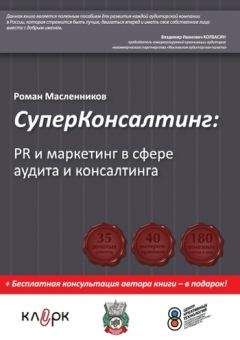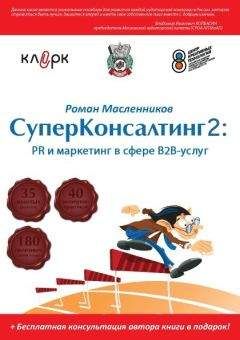Томас Лис - Психология переговоров. Как добиться большего
79
White J. B. The politeness paradox. Getting the Terms you want without sacrificing the relationships you need. – 2011.
80
Goffman E. The presentation of self in everyday life. – New York: Anchor Books, 1967.
81
Curhan J. R., Elfenbein H. A., Kilduff G. J. Getting off on the right foot: subjective value versus economic value in predicting longitudinal job outcomes from job offer negotiations // Journal of Applied Psychology. – 2009. – № 94(2). – P. 524.
82
Davis M. Measuring individual differences in empathy: Evidence for a multidimensional approach // Journal of Personality and Social Psychology. – 1983. – № 44. – P. 113–126.
83
Epley N., Caruso E., Bazerman M. When perspective taking increases taking: Reactive egoism in social interactions // Journal of Personality and Social Psychology. – 2006. – № 91. – P. 872–889.
84
Epley N., Caruso E. M. Egocentric ethics // Social Justice Research. – 2004. – № 17(2). – P. 171–187.
85
Galinsky A., Mussweiler T. First offers as anchors: The role of perspective taking and negotiator focus // Journal of Personality and Social Psychology. – 2001. – № 81. – P. 657–669; Galinsky A. D., Ku G., Wang C. S. Perspective-taking and self-other overlap: Fostering social bonds and facilitating social coordination // Group Processes & Intergroup Relations. – 2005. – № 8. – P. 109–124.
86
Galinsky A., Maddux W., Gilin D., White J. Why it pays to get inside the head of your opponent // Psychological Science. – 2008. – № 19. – P. 378–384.
87
Tversky A., Kahneman D. The framing of decisions and the psychology of choice // Science. – 1981. – № 40. – P. 453–463.
88
Пример взят из книги: Dixit A. K., Nalebuff B. J. Thinking Strategically: The Competitive Edge in Business, Politics, and Everyday Life. – New York, London: W.W. Norton & Company, 1993.
89
Lerner M. J. The belief in a just world. – Springer US, 1980. – P. 9–30.
90
Lerner M. J., Miller D. T. Just world research and the attribution process: Looking back and ahead // Psychological bulletin. – 1978. – № 85(5). – P. 1030.
91
20 августа 2012 года Барак Обама сделал следующее заявление: «Мы очень четко дали понять режиму Ассада и другим участникам конфликта, что последней каплей станет информация о применении или перемещении химического оружия. Это полностью изменит нашу позицию и вынудит пересмотреть отношение к происходящему». Из заявления журналистам в Белом доме.
92
Sinaceur M., Neale M. A. Not all threats are created equal: How implicitness and timing affect the effectiveness of threats in negotiations // Group Decision and Negotiation. – 2005. – № 14(1). – P. 63–85.
93
Nierenberg, G. I. The art of negotiating: Psychological strategies for gaining advantageous bargains. – Barnes & Noble Publishing, 1995. – P. 46.
94
Gross J. Emotional regulation in adulthood: Timing is everything // Current Directions in Psychological Science. – 2001. – № 10. – P. 214–219.
95
Gross J. Emotional regulation: Affective, cognitive and social consequences // Psychophysiology. – 2003. – № 39. – P. 281–291.
96
Butler E. A., Egloff B., Wilhelm F. H., Smith N. C., Gross J. J. The social consequences of emotional regulation // Emotions. – 2003. – № 3. – P. 48–67.
97
Zajonc R. B. Feeling and thinking: Preferences need no inferences // American psychologist. – 1980. – № 35(2). – P. 151.
98
Strack F., Martin L. L., Stepper S. Inhibiting and Facilitating Conditions of the Human Smile: A Nonobtrusive Test of the Facial Feedback Hypothesis // Journal of Personality and Social Psychology. – 1998. – № 54. – P. 768.
99
Isen A. M., Daubman K. A., Nowicki G. P. Positive affect facilitates creative problem solving // Journal of personality and social psychology. – 1987. – № 52(6). – P. 1122; Fredrickson B. L. The role of positive emotions in positive psychology: The broaden-and-build theory of positive emotions // American psychologist. – 2001. – № 56(3). – P. 218; Loewenstein G. F., Thompson L., Bazerman M. H. Social utility and decision making in interpersonal contexts // Journal of Personality and Social psychology. – 1989. – № 57(3). – P. 426; Pillutla M. M., Murnighan J. K. Unfairness, anger, and spite: Emotional rejections of ultimatum offers // Organizational Behavior and Human Decision Processes. – 1996. – № 68(3). – P. 208–224; Allred K. G., Mallozzi J. S., Matsui F., Raia C. P. The influence of anger and compassion on negotiation performance // Organizational Behavior and Human Decision Processes. – 1997. – № 70(3). – 175–187.
100
Bodenhausen G. V., Kramer G. P., Süsser K. Happiness and Stereotypic Thinking in Social Judgment // Journal of Personality and Social Psychology. – 1994. – № 66(4). – P. 621. См. также: Bless H., Clore G. L., Schwarz N., Golisano V., Rabe C., Wölk M. Mood and the Use of Scripts: Does a Happy Mood Really Lead to Mindlessness? // Journal of Personality and Social Psychology. – 1996. – № 71(4). – P. 665.
101
Bodenhausen G. V., Sheppard L. A., Kramer G. P. Negative affect and social judgment: The differential impact of anger and sadness // European Journal of Social Psychology. – 1994. – № 24(1). – P. 45–62.
102
Forgas J. P. Don’t worry, be sad! On the cognitive, motivational and interpersonal benefits of negative mood // Current Directions in Psychological Science. – 2013. – № 22. – P. 225–232; Tiedens L. Z., Linton S. Judgment under emotional certainty and uncertainty: the effects of specific emotions on information processing // Journal of personality and social psychology. – 2001. – № 81(6). – P. 973.
103
Tiedens L. Z., Linton S. Judgment under emotional certainty and uncertainty: the effects of specific emotions on information processing // Journal of personality and social psychology. – 2001. – № 81(6). – P. 973.
104
Lerner J. S., Tiedens L. Z. Portrait of the angry decision maker: How appraisal tendencies shape anger’s influence on cognition // Journal of Behavioral Decision Making. – 2006. – № 19(2). – P. 115–137.
105
Lerner J. S., Tiedens L. Z. Цит. соч.: Lerner J. S., Keltner D. Fear, anger, and risk // Journal of personality and social psychology. – 2001. – № 81(1). – P. 146; Shaver P., Schwartz J., Kirson D., O’connor C. Emotion knowledge: further exploration of a prototype approach // Journal of personality and social psychology. – 1987. – № 52(6). – P. 1061.
106
Lerner J. S., Tiedens L. Z. Portrait of the angry decision maker: How appraisal tendencies shape anger’s influence on cognition // Journal of Behavioral Decision Making. – 2006. – № 19(2). – P. 115–137.
107
Carnevale P. J., Isen A. M. The influence of positive affect and visual access on the discovery of integrative solutions in bilateral negotiation // Organizational behavior and human decision processes. – 1986. – № 37(1). – P. 1–13.
108
Anderson N. R., Neale M. A. All fired up but no one to blame // Working paper Stanford Psychology Department, Palo Alto, CA. – 2006.
109
Neale M. A., Wiltermuth S., Cargle C. Emotion and the uncertainty of negotiation // Working paper, Stanford Graduate School of Business. – 2009.
110
Цит. по: Anderson N. R., Neale M. A.
111
Anderson N. R., Neale M. A. The role of emotions and uncertainty in negotiations // Working paper, Psychology Department, Stanford University, Palo Alto, CA. – 2008.
112
Johnson E. J., Tversky A. Representations of perceptions of risks // Journal of Experimental Psychology: General. – 1984. – № 113(1). – P. 55; Isen A. M., Means B. The influence of positive affect on decision-making strategy // Social cognition. – 1983. – № 2(1). – P. 18–31.
113
Lerner J. S., Tiedens L. Z. Portrait of the angry decision maker: How appraisal tendencies shape anger’s influence on cognition // Journal of Behavioral Decision Making. – 2006. – № 19(2). – P. 115–137.
114
Lerner J. S., Keltner D. Fear, anger, and risk // Journal of personality and social psychology. – 2001. – 81(1). – P. 146.




